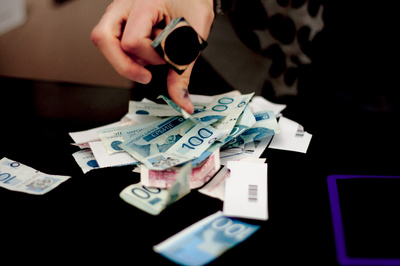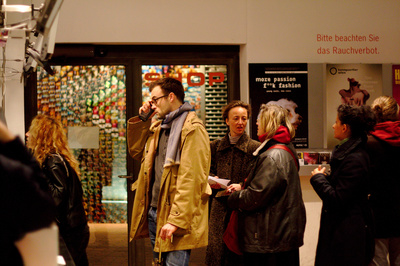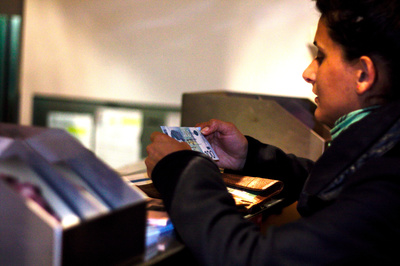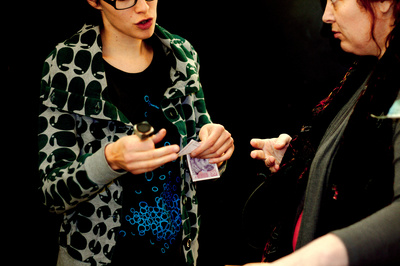"Nah ist
Und schwer zu fassen der Gott.
Wo aber Gefahr ist, wächst
Das Rettende auch.
Friederich Hölderlin (Patmos)
Déjà-vu was an Intervention that formed part of reflections about the concept of history, time and some of the mythologies that societies build around it.
Description:
At the entrance of the dance and theater Hall in Vienna (Tanzquartier Wien) it is the usual queue in front of the ticket window and waiting for the entrance to a show called, Unter Gang Art. It is seven o'clock and this mixture of art students, pensioners, old Vienese Bohemia and lovers of the amusement in any way, shape, or form are to be surprised by a small change on the spectacle routine.
When they arrive to the window, and after paying their tickets, the cashier gives them back not the customary printed small piece of paper, but another banknote for those of them old fashion who still don't use plastic. The only difference with regular banknotes is that this one is stamped with the Tanzquartier logo, and the title of the show. They give a banknote to receive another, as if this would be only a mere banknote exchange in a foreign country. A translation in value, or better , a service for the translation in value, because obviously, the value of the to bills is not the same.
After walking to the other side of the big room adorned or constructed (who knows) in somewhat industrial fashion, they descended through a metallic staircase to arrive at the entrance of the show. In front of them they have a big black door and on their left hand side, a part time female worker who breaks the tickets in halves and retains one of them. This time however, she will actually be destructing money under the surprised and somehow troubled attendance which hoped to retain the bank bill as a souvenir or remembrance trophy of their experience. But no sir, you cannot keep the other side of the bill, and yes, they have to be torn in half.
By the simple operation of destroying money, the public is involved in the perpetration of a crime. They become accessory of a crime by being benefited from, and by the failure of denouncing it. The destruction of money is not only a crime in most of the countries because money is a state property, but it is also a kind of Taboo in our capitalistic society were while individuals are prohibited to do it, banks are allowed to, in a kind of value renewal. A sort of vampiric renewal were the blood of crisis is always remembered.
A superficial interpretation would be here, that this action is rendering inoperative both the value of paper money ( to use a popular Giorgio Agamben expression) and also the fetishistic desire often related with the emergence of the art practice. Prohibiting to give back one half of the paper impedes these illusion of unity to which fetishes aspire.
But we could dig a little deeper, because the operation of making the attendants to a theatrical performance guilty interferes with the concepts of time and morality, and this is where the title of the intervention "Déjà vu" begins to make sense. Lets consider the two consequences of the intervention as the clamps of pliers. On on side, making complicit the public in a crime, on the other making the value of the bill inert. After breaking a capitalistic Taboo, we render money inoperative and then we invite them to travel trough the door and participate in a performance were the art of down-falling is presented, a time where time itself is at the end so to speak.
Being guilty, being damned after desecrating the taboo is however the time where redemption could appear and as Heidegger did say inspired by the verses of Hölderlin “the closer we come to the danger, the more brightly do the ways into the saving power begin to shine”.
This time, the end of time is always in the present, as Walter Benjamin imagined, because the end of time is the time after being damned, where the possibility of redemption arises. It is however another concept of time that is differently structured, something that he named Messianic time but that is in fact inspired by the other concept of time opposed to the classical Chronos, the Kairos.
Opposed to the extensive concept of time, where one second is exactly the same as the next and where the line of progress is executed, Kairos would be the time of possibility the fullfilled time. A concept that was reintroduced to philosophy by Paul Tillich in the XX century. It is as the messianic Time, the time of the present where future and past are always reinterpreted, where every second could make the messiah appear. With this, Walter Benjamin put in question the idea of progress as also the effect of the Déjà-vu manifest the fragility of causality and this constant re-actualization of the structure of time: past and future endlessly reincarnating in the present.
And this is why the destruction of paper money is also a symbolic reorganization of time, were this money, used to pay and reinterpret human activity as a product of the homogeneity of action through the extension of lineal time, has to be destroyed before we enter to the nowTime (JetzZeit) where after the opening of the door, lives the possibility of redemption. Salvation that remains always , however, in the realm of possibility which is the real structure of time. Of the now always damned and eternally to be redeemed.
Robert C. Gallath







